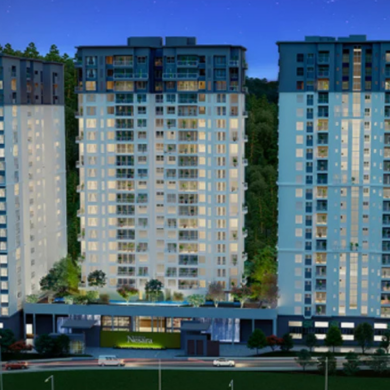
Buying property in Gurgaon can be simple with the right guidance. This beginner’s guide offers key tips on navigating the market, assessing options, and handling legal and financing aspects.
Gurgaon is a thriving residential real estate hub in the National Capital Region (NCR). According to Knight Frank’s India Real Estate Residential and Office Market H1 2024 Report, Gurgaon accounted for 59% of NCR’s new launches – driven by infrastructure upgrades, enhanced connectivity, and high-end projects. This has brought in varied options in contemporary amenities and luxurious living.
Residential areas around Central Peripheral Road (CPR) and Southern Peripheral Road (SPR) saw strong demand due to improved connectivity with Delhi. This blog will help you navigate the process to buy property in Gurgaon, ensuring a smooth and informed purchase in this dynamic market.
Table of Contents
Step-by-Step Guide to Buying a Property in Gurgaon
-
Budget
This exciting city offers a diverse range of properties, but before you start browsing, it is important to finalise your budget for the following reasons:
Realistic Expectations: Knowing your budget helps you focus on properties that truly align with your financial margin. It prevents emotional decisions and ensures long-term financial stability.
Informed Decisions: A clear budget empowers you to compare properties based on affordability, not just amenities. You can prioritise features that matter most within your price range.The average price of a residential property in Gurgaon is ₹11,416 per sq ft (Q2 2024). This figure serves as a starting point, but the final cost depends on numerous factors like:- Property Type: Apartments, villas, and developer’s floors come with varying price tags
- Location: Prime locations naturally command a premium
- Size and Amenities: Larger spaces and lavish amenities add to the cost
Here is how to design your budget thoughtfully to buy property in Gurgaon:
Realistic Expectations: Knowing your budget helps you focus on properties that truly align with your financial margin. It prevents emotional decisions and ensures long-term financial stability.
Income and Savings: Analyse your monthly income and existing savings. Factor in your debt obligations to determine how much you can comfortably allocate towards property purchase.
Down Payment: Aim for a higher down payment (ideally 20% or more) to reduce your loan burden and interest payments
Loan Eligibility: Explore pre-approval options with different lenders to understand your loan eligibility and potential interest ratesHidden Costs: Factor in additional expenses such as registration fees, stamp duty, and potential maintenance charges
-
Understanding your Needs
With a budget in place, understanding your specific needs is crucial to buy property in Gurgaon. This ensures you find a property that perfectly complements your lifestyle and aspirations. Here is how to define your needs:
Lifestyle Analysis: Consider your daily routine and preferred environment. Are you a young professional seeking a studio apartment close to work, or a growing family needing a spacious multi-bedroom unit?
Family Dynamics: Determine the number of bedrooms and bathrooms required. Factor in future requirements, such as family expansion or space for elderly parents.
Location Preferences: Prioritise proximity to workplaces, schools, colleges, and entertainment hubs. Consider your daily commute and access to amenities like clubhouses, swimming pools, and gyms.
Long-term Vision: Decide if you are buying for self-occupancy or investment. Research rental yields and potential appreciation in different Gurgaon localities. -
Researching Properties
The next step in your journey to buy property in Gurgaon is conducting thorough research on available properties. This crucial phase involves gathering detailed information to ensure you take an informed decision that aligns with your preferences and financial plan.
Key Steps in Researching to Buy Property in Gurgaon:
Property Listing Websites: Utilise platforms like 99acres, MagicBricks, and Housing.com to view property listings, compare prices, and observe trends in various locations.
Real Estate Research Reports: Refer to in-depth research reports published by organisations such as JLL India, Knight Frank India, and CBRE for market analysis and future projections.
RERA Websites: Check state-specific RERA websites for information on registered projects, developer details, and legal compliances.
Real Estate Market News Portals: Stay updated on the latest gurgaon real estate market trends, policy changes, and news – through portals such as Livemint, Economic Times Real Estate, and Realty Fact
Social media and Forums: Engage in networking and discussions on platforms such as LinkedIn, Twitter, and Indian Real Estate Forum (IREF) to gather insights from industry professionals.
Google Trends: Monitor the popularity of real estate-related search terms over time and across regions to gauge market interest.
Professional Consultation: Seek advice from real estate consultants, brokers, and experts familiar with local markets for insights that may not be easily available through other sources. -
Shortlisting Properties
After diligently researching properties in Gurgaon, it is time to refine your search and shortlist the options that resonate most with your vision. This step involves carefully evaluating each property against your established criteria to identify homes with the highest potential to become your dream abode.
Strategies for Effective Shortlisting to Buy Property in Gurgaon
Reconsider Your Needs: Revisit your initial list of needs and preferences. Has anything changed during your research? Refine your shortlist based on updated priorities, if any.
Compare and Analyse: The shortlisted properties should be meticulously compared. Look beyond aesthetics and delve into factors such as amenities offered, maintenance charges, developer reputation, and potential future appreciation.
Seek Expert Advice: Discuss your shortlisted properties with your real estate consultant. Leverage their expertise to gain insights into potential future developments in specific localities or hidden negotiation opportunities. -
Due Diligence
The vital step in your journey to buy property in Gurgaon is conducting due diligence. This stage ensures that the home you choose is legally sound, meets all your requirements, and is acquired at a fair price.
Key Steps in Due Diligence to Buy Property in Gurgaon
Verify Property Title: Ensure the property has a clear and marketable title. Check for any encumbrances or disputes by reviewing the title deed and conducting a title search through a legal expert.
Check RERA Registration: Verify if the property is registered with the Haryana Real Estate Regulatory Authority (HRERA). This confirms that the project adheres to regulatory standards and offers greater transparency.
Review Legal Documents: Examine key documents such as sale deed, encumbrance certificate, occupancy certificate, and approved building plans. This step ensures that all legal aspects are in order.
Inspect Property Condition: Conduct a thorough inspection of the property’s physical condition. Check for construction quality, structural integrity, and the state of utilities like water, electricity, and drainage systems.
Assess Developer Reputation: Research the developer’s track record – including past projects, delivery timelines, and customer reviews. A reputable developer is more likely to deliver a high-quality property and adhere to promised timelines.
Evaluate Financial Aspects: Confirm the property’s market value through comparative market analysis. Assess any outstanding loans or liabilities associated with the property. -
Property Visits and Inspection
It is now time for visiting and inspecting the shortlisted properties. This hands-on evaluation is essential to ensure that the property meets your expectations and is in good condition. Property visits and inspections provide a tangible sense of the space, neighbourhood, and overall fit with your lifestyle needs.
Schedule Efficient Visits: Group shortlisted properties geographically close together to utilise your time better and to minimise travel hassles
Prepare a Checklist: Create a checklist of essential aspects to assess during each visit – including layout functionality, natural light, noise levels, and the condition of amenities
Ask Insightful Questions: Do not hesitate to ask the developer‘s representative or seller detailed questions about the property, amenities, maintenance charges, and future development plans in the surrounding area -
Legal and Technical Aspects
These aspects ensure a smooth and secure transaction. Addressing legal and technical requirements upfront safeguards your investment and provides peace of mind throughout the ownership journey.
Essential Considerations in Gurgaon:
Loan Approval (if applicable): If you are financing the purchase, ensure you have a formal loan approval from your chosen bank or lender. This confirms the loan amount and interest rate, allowing you to proceed confidently with the purchase negotiations.
Property Taxes and Dues: Verify that all property taxes and dues are paid up to date by the seller. You do not want to inherit any outstanding liabilities.
Society / Apartment Association Registration: For apartments, ensure the society or apartment association is registered.
Technical Inspections (Optional): Get a structural inspection conducted by a qualified engineer, especially for older properties. This can uncover potential structural issues and provide valuable insights for future maintenance needs. -
Negotiation
When it comes to purchasing a luxury apartment, the negotiation process takes on added complexity and significance. To buy property in Gurgaon, particularly a high-end residence, requires strategic negotiation to secure the best possible deal on a premium investment. This step ensures that you not only acquire a highly sought-after property, but also maximise the value of your investment.
Key Steps in Negotiating:
Conduct Thorough Market Research: Investigate the current market trends for apartments in Gurgaon. Understand the average price per square foot, and recent sales data.
Determine Your Budget and Limits: Establish your maximum budget and an ideal purchase price. Knowing your financial boundaries helps maintain control during negotiations.
Understand the Developer’s Offerings: Learn about the developer’s portfolio, reputation, and the unique selling points of the apartment.
Assess the Property’s Unique Features: Evaluate the features and amenities that make the apartment stand out. These may include high-end fittings, smart home technology, exclusive views, or bespoke services.
Discuss Payment Plans: Apartments often come with flexible payment options. Negotiate on deferred payment schedules, interest rates, or customised instalment plans.
Engage Professional Assistance: Hire a real estate consultant specialising in properties. Their expertise and market knowledge can significantly enhance your negotiating power. -
Loan Finalisations
Securing a loan is essential when you buy property in Gurgaon. Here is a streamlined guide to finalising your loan:
Assess Eligibility: Check your credit score and financial health to understand your loan eligibility.
Compare Loan Options: Compare interest rates, tenures, and fees from different lenders to find the best option.
Gather Documents: Prepare income proof (salary slips, tax returns), property documents (sale deed, title deed), and identity proof.
Submit Application: Complete the loan application form and submit the required documents
Processing and Approval: The lender will verify documents and assess the property value. Upon approval, you will receive a sanction letter.
Sign Agreement: Review and sign the loan agreement, then complete any necessary formalities such as setting up EMI payments. The lender will disburse the loan amount, which you can use for your property purchase.
Follow-up: Monitor loan payments regularly.
Additional Considerations for First-time Buyers in Gurgaon
- Understanding Local Market Trends: When you decide to buy property in Gurgaon, investigating emerging areas and upcoming infrastructure projects is crucial. These factors can help you identify locations with significant growth potential and future value increases.
- Evaluating Developer Reputation: Researching the developer’s track record is essential. Look into their history of timely project completion and construction quality by reviewing their previous projects, to gauge their reliability.
- Considering Future Resale Value: Assess factors that may affect the property’s future resale value, such as planned developments or changes in the neighbourhood. This foresight helps in making a prudent decision when you buy property in Gurgaon.
- Evaluating Home Insurance Options: This can protect against risks such as fire, theft, or natural disasters – ensuring additional security for your investment
- Exploring Property Management Services: For investment purposes, consider property management services to handle maintenance, tenant management, and maximise returns
6 Important Questions to Ask Sellers / Agents During the Process
-
What is the asking price and how flexible is it?
A: Understanding the asking price is key, but also inquire about the flexibility of the price. Developers or sellers might be open to negotiations, which can help you secure a better deal when you buy property in Gurgaon.
-
What are the additional costs involved?
A: Ask about any additional costs associated with the purchase – such as maintenance fees, property taxes, or homeowners’ association fees. Knowing these costs upfront helps in budgeting accurately.
-
What is the status of the property’s legal documentation?
A: Ensure that all legal documentation, including the sale deed and any approvals from local authorities, is in order. This helps in avoiding legal issues and ensures compliance, when you buy property in Gurgaon.
-
What amenities and services are included?
A: Inquire about the amenities and services included with the property – such as parking, security, and access to community facilities. Understanding what is included helps you assess the overall value and suitability of the property.
-
What is the expected complete date?
A: If buying an under-construction property, confirm the expected completion date and the developer’s record of delivering projects on time. This ensures you have realistic expectations regarding when you can move in.
-
Are they any planned developments in the area?
A: Inquire about any planned developments or infrastructure projects in the vicinity that could impact the property’s value or your living experience. Future developments can significantly influence the long-term value of your home.
Glossary of Common Real Estate Terms in India
Understanding real estate terminology is crucial to buy property in Gurgaon. Here is a glossary of common terms you might encounter in the Indian real estate market:
- Advance Payment – A partial payment made before the final sale to secure the property. This is often non-refundable and is deducted from the total purchase price.
- Agreement to Sell – A legal document that outlines the terms and conditions agreed upon by the buyer and seller, before the final sale is completed. It includes details such as sale price, payment schedule, and possession date.
Read More: Difference Between Sale and Agreement to Sell - Developer Floor – A type of residential property where an individual owns a specific floor of a multi-storey building, while the land and other floors are owned by different individuals or developers.
- Carpet Area – The actual usable area within the walls of a property, excluding areas like walls, balconies, and common spaces. It is used to measure the usable space available to the buyer.
- Completion Certificate (CC) – A certificate issued by local municipal authorities that confirms that the construction of the property is complete and complies with all building regulations and approved plans.
- Developer – A company or individual responsible for the construction and development of a property. Developers are often involved in planning, construction, and selling of real estate projects.
- Encumbrance Certificate – A legal document that certifies that the property is free from any monetary or legal liabilities. It is essential for proving the property’s clear title and is required during property transactions.
- Freehold Property – A type of property ownership where the buyer owns the property and the land it is built on indefinitely, with no time limit or lease conditions. It provides complete ownership rights.
- Loan-to-Value Ratio (LTV) – The ratio of the loan amount to the property’s value. It helps determine the amount of loan a buyer can obtain relative to the property’s value, influencing loan approval and terms.
- Possession Date – The date on which the buyer takes physical possession of the property from the seller or developer. It is crucial for planning the move-in and finalising the transaction.
- RERA Act – A regulatory framework established to promote transparency and accountability in the real estate sector. RERA mandates developers to register projects and adhere to specific guidelines to protect buyers’ interests.
- Stamp Duty – A tax paid to the state government on the legal document of the property transaction. It is a pre-defined percentage of the property’s sale value and is mandatory for legally registering the property.
- Title Deed – A legal document that proves ownership of the property. It includes details of the owner and the property’s legal status and is essential for transferring ownership.
- Urban Land Ceiling Act – A regulation designed to control the amount of land an individual or entity can own in urban areas, aimed at preventing land hoarding and ensuring land availability for development.
- Valuation Report – A document prepared by a certified valuer that assesses the market value of the property. It is often required for securing a loan and understanding the fair market price.
Conclusion
To sum up, buying property in Gurgaon can be a rewarding experience with the right approach. Start by establishing a clear budget and understanding your needs to find a property that suits your lifestyle. Research thoroughly and shortlist options that meet your criteria. Conduct due diligence, negotiate effectively, and ensure all legal and technical aspects are covered.
For first-time buyers, additional considerations like market trends and developer reputation are crucial. Ask the right questions and know key real estate terms to take informed decisions. With this guide, you are equipped to buy property in Gurgaon confidently.
FAQs
1. Is it worth buying a property in Gurgaon?
Yes, it is worth buying a property in Gurgaon due to booming real estate market, robust infrastructure, excellent investment opportunities, and proximity to Delhi.
2. How much does it cost to register a property in Gurgaon?
The cost to register a property in Gurgaon includes stamp duty (7% for men & 5% for women within the municipal limits; 5% for men & 3% for women outside the municipal limits) and registration charge of 1% of the property value.
3. Why is Gurgaon property so expensive?
Gurgaon properties are expensive due to strategic location, rapid urbanisation, proximity to major business hubs, and high demand for residential & commercial spaces.
4. Is it worth buying affordable housing in Gurgaon?
Yes, it is worth buying affordable housing in Gurgaon, as it offers value for money to budget-conscious buyers and potential for future appreciation as the area develops.
5. Is 70k enough to live in Gurgaon?
Yes, a budget of 70k INR per month is enough to live in Gurgaon, as it can provide a comfortable lifestyle including rent, utilities, and other expenses.
6. Is Gurgaon cheap to live?
Gurgaon is considered an expensive city to live in, due to high property prices and living costs. However, these amounts can vary depending on the area and lifestyle choices.
7. What is the current state of the real estate market in Gurgaon?
Currently the real estate market in Gurgaon is vibrant, with a mix of high-end and affordable housing projects. There is ongoing development in infrastructure and increased interest from both buyers and investors.
8. What are the diverse types of properties available in Gurgaon (apartments, developer floors, villas, etc.) and their pros and cons?
Diverse types of properties available in Gurgaon are apartments that offer amenities and security but may have higher maintenance fees, developer floors that provide more privacy and space but might lack shared facilities, and villas that offer luxury and independence but are more expensive and require more maintenance.
9. Is it better to buy a ready-to-move-in property or an under-construction one?
Buying a ready-to-move-in property or an under-construction one depends on your choices and requirements, as both have their own advantages. Ready-to-move-in properties offer immediate possession while under-construction properties may be cheaper, with higher potential appreciation and more opportunities for customisation.
10. What are the additional costs involved besides the property price (registration, stamp duty, etc.)?
Additional costs involved besides the property price are stamp duty, registration fees, legal fees, property tax, maintenance charges, and brokerage fees.
11. What is the home loan options available in Gurgaon, and what are the eligibility criteria?
Home loan options available in Gurgaon are fixed-rate and floating-rate loans from various banks and financial institutions; eligibility criteria depend on your income, credit score, and employment status.
12. What is the typical down payment required for a property purchase in Gurgaon?
The typical down payment required for a property purchase in Gurgaon is 10-20% of the property’s total value, depending on the lender's policies.
13. What documents should I be wary of when buying property in Gurgaon?
Documents you should be wary of when buying property in Gurgaon are title deed, sale agreement, encumbrance certificate, completion certificate, and property tax receipts.
14. What are the legalities involved in property ownership transfer?
Legalities involved in property ownership transfer are verifying property documents, ensuring clear title, drafting and signing the sale deed, paying stamp duty, and registering the property with local authorities.
15. What are the tax implications of buying property in Gurgaon?
Tax implications of buying property in Gurgaon are stamp duty, registration fees, capital gains tax if you sell the property in the future, tax benefits on home loans under Section 24 and Section 80C of the Income Tax Act.







